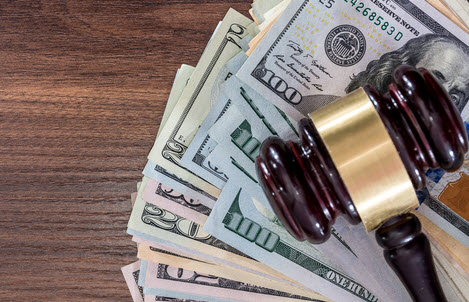Can I Collect Money Owed to Me by a Bankrupt Customer?
While most people do not declare bankruptcy out of spite toward creditors, it can feel like that when you are on the other end of bankruptcy—the “owed money” end. As a business owner, you rely on customers to pay you on time and in full, so when one does not, you do what is necessary to collect the debt, which is call them, send out notices of past due payments, and send their invoice to collections. Though these measures are extremely reasonable to take when someone owes you money, they are illegal when that person files for bankruptcy.
The Automatic Stay
Once a debtor files for bankruptcy, an order for relief is automatically put in place. This order protects the debtor from any further attempts at debt collection, in accordance with the Bankruptcy Code, § 362. This section of the code does provide for some exceptions, though. For instance, recent repeat filers are not protected by the stay, and nor are some types of debt. However, it is rare for a stay not to apply to all of a debtor’s creditors, so if you believe that the stay should not apply to you, talk with a creditors’ rights attorney before you follow through with any further debt collection actions. If you unwittingly violate an order for relief, the consequences can be costly, and you may end up losing far more money than what you are owed.
Your Debt Collection Options
The first step, of course, is to cease all debt collection efforts. This includes dismissing any pending lawsuits that you have against the debtor. Once you have done that, consult with a knowledgeable creditors’ rights lawyer about your options.
Unfortunately, if the debtor has filed for Chapter 7, your options are few, if any, as in almost all Chapter 7 cases, most debts go unpaid. This is because a debtor likely owed money on his or her home and any other assets of value, which will be sold to repay the mortgage lender and other high priority lenders. That being said, you do have the right to appear at the 341 meeting, which is a meeting held between the debtor and creditors. At the meeting, creditors are given the chance to question the debtor, though that rarely ever happens.
The meeting is conducted by a bankruptcy trustee who is assigned to the case. It is the trustee’s job to verify the accuracy of all the information presented in the bankruptcy file, which he or she does during the meeting. Trustees generally do not like to be interrupted by creditors conducting an interrogation, as that is not the point of the meeting. The only type of interruption the trusty would welcome is one that includes information regarding hidden assets or an undisclosed source of income. If you do have information regarding a home that the debtor did not list, or if you know for a fact that the debtor makes more than he or she put in the application, show up to the meeting armed with proof.
If you believe that the debt owed to you qualifies as exempt, you need to present the issue in bankruptcy court. Non-dischargeable debts include ones that are related to domestic support obligation, wrongful death or personal injury settlements, willful and malicious injury awards, or fraud. Except for debts related to support obligations or death or personal injury, you will need to present your case in front of a board, who will review the evidence and make a determination regarding dischargeability.
Your Options in a Chapter 13
If a debtor files for Chapter 13 instead of Chapter 7, your odds of getting paid increase, but depending on the nature of the debt, they may not increase by much. In a Chapter 13, a debtor’s obligations are reorganized, and he or she sets up a repayment plan that will make it easier for them to repay debts owed over an extended period of time. Typically the term of a Chapter 13 is five years.
Once an obligor files for a Chapter 13, all creditors will receive a copy of the proposed repayment plan. The plan will outline which creditors will receive what. Unfortunately, only a fraction of what is owed will ever be paid on unsecured debts. In order to receive any payment, you will have to provide a Proof of Claim form to verify the existence of a debt. Though you have the option to oppose the plan, you should only do so if you have a valid reason to. Otherwise, you risk wasting the bankruptcy court’s time, which may hurt your case in the long run.
Consult With an Experienced Mobile Creditors’ Rights Attorney
At Cloud Willis & Ellis, we understand that you may be feeling frustrated with a debtor who has filed for bankruptcy, and while that is completely natural, you need to refrain from taking any drastic debt collection measures. If you believe that the debt owed to you is non-dischargeable, or if you want to oppose the bankruptcy for any reason, consult with a creditors’ rights lawyer before you do anything. If you violate any of the debtor’s rights, you may lose more than you set out to gain.
Resource:
law.cornell.edu/uscode/text/11/362


